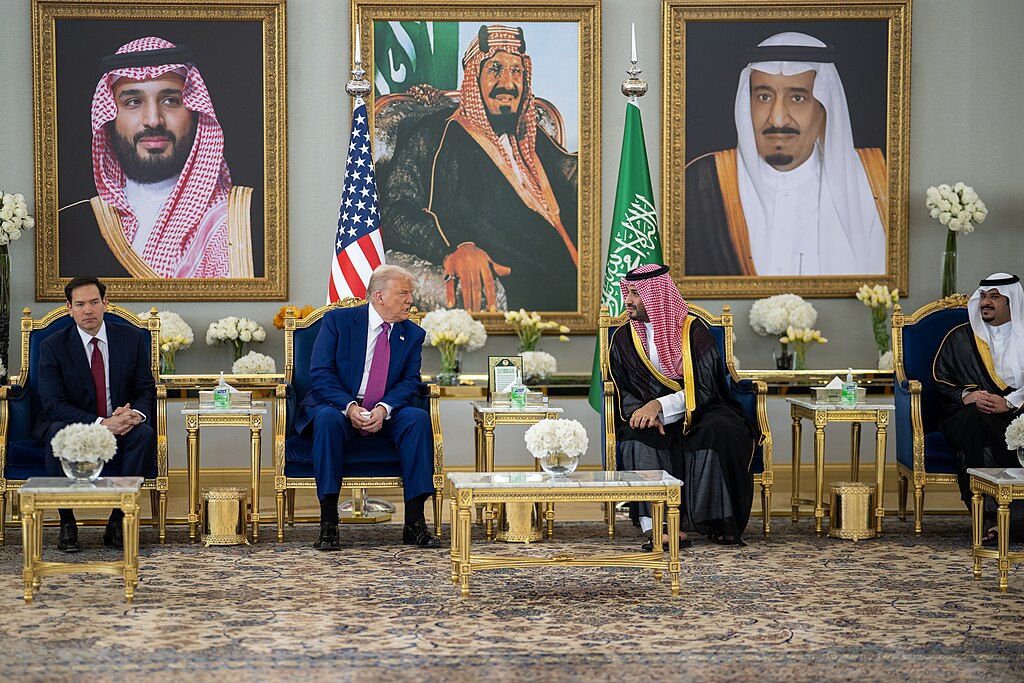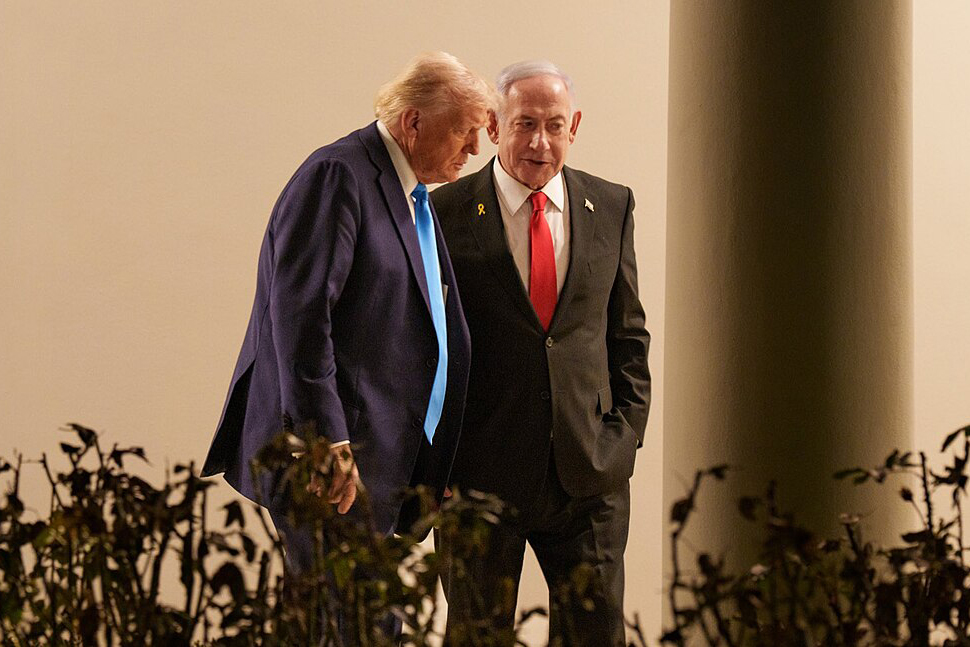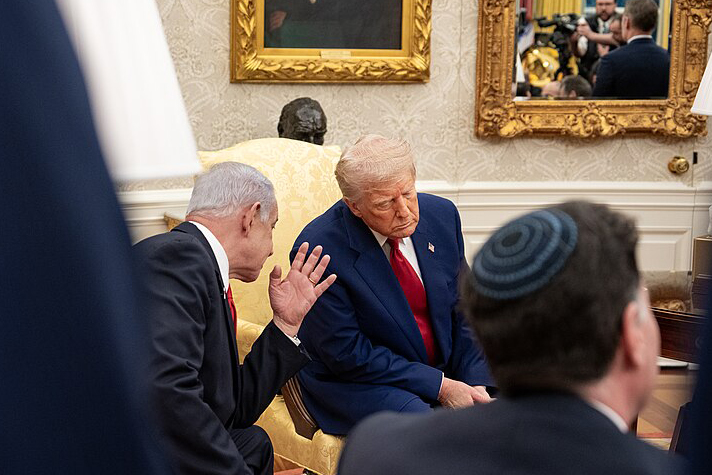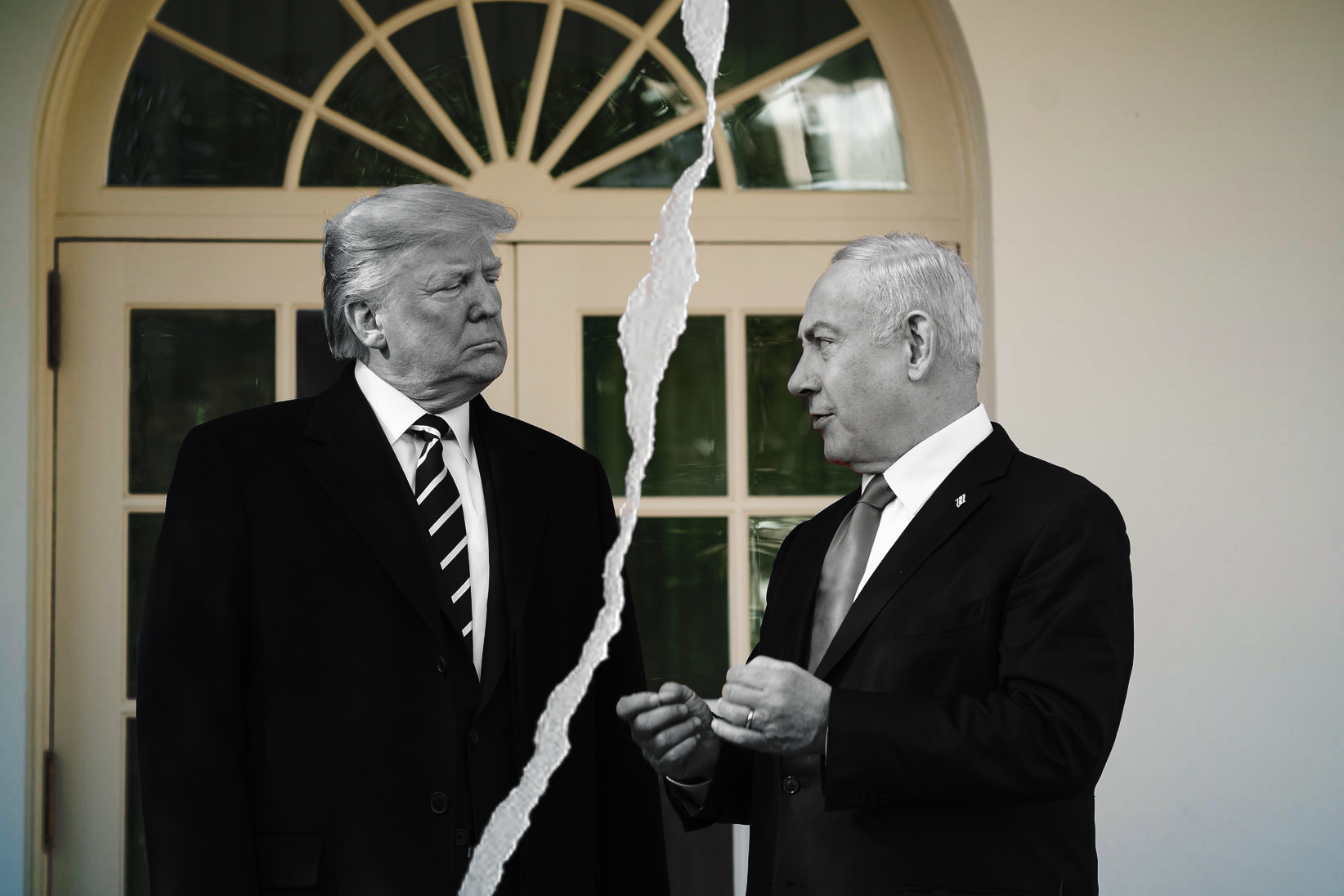Two months after Benjamin Netanyahu broke the short-lived ceasefire, the situation in Gaza has reached catastrophic levels. Aid, medicine, and essentials have dried up thanks to Israel’s complete blockade, and the IDF’s relentless bombing has resumed. Countless humanitarian organisations have warned that the blockade is on the precipice of killing tens of thousands of people in a widespread famine.
Now, the mobilisation of 70,000 IDF reservists for a new land offensive in Gaza – Operation Gideon’s Chariots – is on the cards. Netanyahu’s declared aim is the permanent occupation of most of the Gaza Strip and the forced displacement of two million Palestinians – first to the southernmost part of Gaza, and then from their homeland entirely. This amounts to nothing short of a new Nakba.
With this escalation, Netanyahu is openly turning his back on the idea of returning the hostages, effectively signing their death warrants. This is fuelling a seething hatred towards him in Israeli society where 70 percent of the population would prefer the end of the war if it means the return of the hostages. 87 percent of Israelis, furthermore, believe that Netanyahu should accept responsibility for the 7 October attacks, and 72.5 percent believe that he should resign. As the threads of Israeli society fray under the strain of this war, Netanyahu is desperately attempting to cling to power by tying himself to the most extreme elements in the Knesset.
The military escalation is taking place amidst deteriorating relations between Israel and the US.
Donald Trump continues to reiterate the idea of turning Gaza into “the Riviera of the Middle East” – an idea he has now dubbed a “freedom zone” – by expelling Palestinians in Gaza to Egypt and Jordan. However, he is now also stating that he seeks “an end to this brutal conflict” – a stance that flies in the face of Netanyahu’s insistence on fighting the war to the end. Meanwhile he was negotiating directly with Hamas for the release of the last remaining US hostage, Edan Alexander, bypassing Israel entirely. At a time when Netanyahu is throwing the remaining hostages to the wolves, this is a political humiliation.
Things have reached such a low that Trump is said to have broken off all relations with Netanyahu. For Netanyahu, who has been conducting military interventions on five fronts since 7 October 2023, the blank cheque that he has been able to draw upon from the US has been central to the whole policy that has kept him in power.
But Trump is signalling that he will not stake all of US imperialism’s interests in the region on Israel, and he is now striking myriad deals with other regimes that cut Israel out entirely. This is a sharp change in US foreign policy, which before the arrival of Trump was near unbounded support for Netanyahu.
Trump cuts Netanyahu out
In a week where Donald J. Trump has been touring the Gulf signing big, headline deals with Saudi Arabia, Qatar, and the United Arab Emirates on trade, oil, and investment, Netanyahu appears to have been completely relegated to the sidelines.
Trump has struck a $1 trillion deal with Saudi Arabia, including on uranium enrichment for Saudi Arabia’s civilian nuclear programme, a deal sure to cause alarm in Jerusalem. Such deals, and in particular deals related to a potential Saudi nuclear programme, have always been linked with normalisation of relations with Israel. That clause was no longer present in any of the deals of the past week.
Trump has even agreed to entirely lift sanctions on Syria’s new Islamist regime. For Israel, this represents another bitter blow. The IDF has systematically bombed Syrian military installations since Assad’s fall, even expanding its operational zone beyond the Golan Heights further into Syrian territory. By undermining Israel’s strategy of keeping al-Jolani’s regime fragile, this move strengthens Israel’s Turkish rivals, who are the primary backers of the new rulers of Damascus.

All of these dizzying series of deals were carried on completely behind the back of Netanyahu. They followed a deal negotiated with the Houthis where Israel, again, was kept in the dark. In exchange for the US ceasing its assault on Yemen, the Houthis agreed to halt their attacks on Red Sea shipping lanes. Most tellingly, the deal imposed no restrictions on Houthi attacks against Israel, effectively leaving Israel to confront this threat alone. This agreement came just one day after the Houthis successfully struck Ben Gurion Airport near Tel Aviv, with many international airlines suspending flights to Israel for weeks.
Perhaps most ominous for Netanyahu, Trump has been engaged in negotiating a nuclear deal with Iran, preparing for a fifth round of talks in Oman. The Houthi truce serves as another goodwill gesture to Tehran, demonstrating Trump’s commitment to finalising an agreement.
True to form, Trump’s messaging on Iran remains deliberately ambiguous. Yet his harsh treatment of former security adviser Mike Waltz speaks volumes. Waltz reportedly pursued his own hawkish agenda – pressuring the Trump administration on behalf of Netanyahu and Israeli officials to carry out a strike on Iranian nuclear facilities – only to be swiftly demoted. Though Netanyahu claims to have spoken with Waltz only once, Trump clearly didn’t buy this explanation.
Things have deteriorated to such a point that Netanyahu is now thinking the unthinkable: that the day may come when US military assistance will end. He told his cabinet, “I think we’ll reach a point where we wean ourselves off [US military assistance].”
All this represents a sharp turn in US foreign policy. From backing Israel to the hilt, as Biden had done, and as Trump seemed to be doing when promoting his own plan to ethnically cleanse Gaza, Trump is now seeking to make deals and find other points of support in the region, to the detriment of Israel.
Trump’s goal
When Trump’s Gaza plan was first announced in the Oval Office, the prospect had Netanyahu and his far-right cabinet gushing. But while Trump does not have any principled opposition to Israel and its continued expansion, he has his own regional objectives that don’t align with unconditional support for Netanyahu.
Ultimately, Trump’s support is conditional, hinging on his ability to pursue a broader Middle East policy, particularly regarding Iran. Trump firmly believes the American dog should wag the Israeli tail, not vice versa.
It is in this context that we must understand the sudden souring of relations between Netanyahu and Trump. Far from being a mere personal rift, this development reveals diverging strategic interests regarding Israel’s and America’s future roles in the Middle East.

Donald Trump is no pacifist. But, the Middle East occupies secondary importance in his calculus. His regional objectives focus chiefly on securing deals that avoid further destabilisation while benefiting US economic interests, enabling him to concentrate on domestic priorities, as well as China. He wants to withdraw US forces from the Middle East, but he wants to do so without further destabilising the situation. This is easier said than done. He is also acutely aware that the continuation of the war in Gaza is full of revolutionary implications, in Jordan, in the Gulf States, in Egypt and beyond.
Trump’s thinking does not, of course, stem from any sympathy for the Palestinians, but from recognising that unlimited support for an increasingly reckless and genocidal ally would drag the US into another military adventure like the wars in Afghanistan and Iraq.
It was Trump and Steven Witkoff who originally forced Netanyahu’s hand into agreeing to a multi-stage ceasefire as a way to ultimately end Israel’s war. While the plan for the day after was anything but clear, it cannot be denied that Trump saw ending the Gaza war as a priority.
Netanyahu could not end the war, however, as its end would have meant the end of his political career and his own demise. He thus took the first opportunity to break the ceasefire after its first phase.
This threw a spanner in the works of Trump’s plans. For Trump, it was a clear indication that Netanyahu was prepared to undermine him for the sake of political survival.
Trump’s ‘Gaza plan’ – announced during the ceasefire – was essentially a gesture to Netanyahu, signalling that while he would support Israel’s Zionist goals, this must be done on American terms. When Netanyahu broke this imperialist peace to maintain his alliance with his far-right coalition partners, he indirectly told Trump that his government’s survival and the continuation of the war mattered more than US interests.
Such behaviour doesn’t sit well with Trump, particularly when coming from someone claiming to be America’s closest ally. A senior Trump ally reportedly told Ron Dermer – Netanyahu’s closest confidant – that the president’s greatest irritation is being perceived as naive or manipulated, and that Netanyahu was doing exactly that.
When Trump says ‘America First’, he means it. This inevitably makes Netanyahu’s hardline ‘Israel First’ (or rather, ‘Netanyahu First’) policy a source of friction with the potential of creating a full-blown crisis between the US and Israel over both Gaza and Iran.
Friends and foes
The old adage holds that nations have no permanent friends or enemies, only permanent interests. Trump has demonstrated this truth first in Europe, and now even in the ‘special relationship’ between the US and Israel.

The Houthi truce highlights Trump’s implicit recognition that American imperialism can no longer afford to police every global conflict. With the U.S. national debt ballooning and the federal deficit widening, Trump sees such open-ended commitments on secondary fronts as fundamentally unsustainable.
This exemplifies Trump’s cut-your-losses approach. Previously, the notion of abruptly ending military operations (effectively admitting defeat) to negotiate with one of Israel’s principal Iranian-backed adversaries would have been unthinkable. No longer.
Ultimately, Trump viewed the campaign as a poor investment, failing to achieve its objectives, draining finances, and squandering military resources that could better be used to secure its own backyard and deter China.
Much has been said about Trump dismantling the old world order in Europe, but the Middle East too faces seismic shifts in US engagement. Trump’s policy is a recognition that US imperialism is no longer an all-powerful hegemon. It has been forced to recognise this fact and cut deals, at the expense of the US’ main ally: with the Saudis, with the Turks, and above all with Iran, as Obama before him was forced to do with the Iran nuclear deal in 2015.
But his attempts to disentangle US imperialism from the contradictions in which it is caught will not lead to greater stability. Quite the contrary.
In openly opposing this turn, Israel, which has long been a key strategic asset, risks becoming a liability for Washington.
Netanyahu’s desperate bid
But Netanyahu is not going to back off easily. His calculation is, on the one hand, to keep himself at a safe distance from any legal proceedings that a pause in the genocidal campaign might allow. Even before 7 October, both ‘Qatargate’ and a slew of other corruption cases had been a constant source of concern, with the potential to bring him down, and Israel had seen a series of mass mobilisations, with a powerful section of the Israeli ruling class pitted against him.
The lengths to which Netanyahu will go to force the judicial genie back into the bottle were clearly demonstrated when he broke the ceasefire just hours before an important court hearing, creating a justification for its indefinite postponement.
Moreover, the past few months have seen Netanyahu engaged in open conflict with Ronen Bar, the head of the Israeli security agency, Shin Bet. Bar publicly accused Netanyahu of breaking the law by instructing the security agency to spy on and clamp down on anti-government protests, as well as ordering Bar to obey Netanyahu himself over the Israeli High Court.
This is no minor accusation, and it shows how the war in Gaza – far from uniting the state’s ruling branches – is pitting different layers of the ruling class against each other. In turn, this undermines the Israeli regime itself and sets the stage for major political and social crises in the coming period.
Netanyahu clearly saw the danger of Bar’s accusations becoming the centre of a major trial and viciously counter-attacked. In the end, this pressure forced Bar to step down, annulling the immediate effect of his accusations before a formal legal proceeding could come about.
At the same time, Netanyahu’s political coalition is resting on the support of far-right elements in the form of Finance Minister Bezalel Smotrich and Minister of National Security Itamar Ben-Gvir. These fanatics view the completion of the Zionist project – the ethnic cleansing of the Palestinians and the permanent occupation of Gaza and the West Bank – as Israel’s one and only goal.
While Netanyahu cannot ignore Trump fully, he is constantly tying his own political fate more tightly to Ben-Gvir and Smotrich. The resumption of the war in March was not only a means to get out of his own legal tangle, but was also the only way for him to get a new budget passed in the Knesset. Without getting Ben-Gvir and Smotrich on board again by resuming the war, the budget would not have passed and the parliament would have been automatically dissolved, triggering new elections. That would have been the end of Netanyahu.
As such, Ben-Gvir and Smotrich have become Netanyahu’s kingmakers, and they are well aware of this fact. They now openly state in Israeli media that the goal of the war is not and has never been to free the Israeli hostages, but to conquer Gaza. “Within a few months… Gaza will be totally destroyed,” Smotrich said recently. As for Trump’s original plan to depopulate Gaza and carry through a forced exodus of millions of people, Smotrich has said that the government “has no right to exist” if it does not go through with this plan.

Netanyahu is set on wrecking any possible hostage deal that might come about from Trump’s visit to the Gulf. Repeating this position before reluctantly sending an Israeli delegation to Doha on the orders of Trump, Netanyahu stated that Israel will accept nothing less than a complete disarmament of Hamas, which must then give up governance of Gaza.
In a meeting with wounded IDF soldiers on Monday, Netanyahu was reported to have said that “within days, things are going to happen in Gaza… that you have never seen before until now”, and that Israel would occupy Gaza “forever”.
The line of trajectory of the Israeli regime is clear. Netanyahu intends to go all the way in Gaza, come what may. This will not only widen the cracks opening up between Israel and the US, but also fan the flames of crisis within Israel itself.
Already, serious doubt is being cast publicly by leading figures in the IDF on Israel’s ability to sustain another prolongation of the war. According to the IDF, it “will consider itself fortunate if 60-70 percent of those who are called actually present themselves for duty.” This is down from 120 percent presenting themselves for duty at the start of the war – that is, more IDF reservists were volunteering to fight than were called up – falling to 80 percent earlier this year, and falling further since.
The war is now pulling Israeli capitalism apart by the seams. Political, military, economic and social tensions are all rising. With Netanyahu dragging on the genocide, the long-term implications for Israel are growing. The fact is that the war has solved nothing for the Zionist ruling class.
Destroying Hamas is an illusory goal, something Netanyahu is well aware of but uses cynically to further his own rule. While Hamas has lost many of its leaders, the war has enormously radicalised Palestinian youth who are ready to replenish the ranks of the organisation.
Even Netanyahu’s own demands tacitly make clear the impossibility of defeating Hamas. Among his conditions for any Israeli ceasefire is the demand that Hamas reveal who its leaders are. That is to say, Hamas has been beheaded and to a certain extent has turned into a leaderless resistance movement, without any clear targets to strike.
Israel is becoming more exposed and fragile both internally and on the world stage. The genocide at the end of the day has not strengthened Israel, but weakened it. The Zionist ruling class has always built its social support on the myth that it is able to ‘protect’ the Israeli population. Far from ensuring security, it is throwing the lives of Israelis into turmoil. It is estimated that 100,000 Israelis have developed mental illnesses as a result of the war.
With Trump plotting to secure his own interests elsewhere, Netanyahu is desperately pushing the idea that Israel can survive and prosper as a highly militarised state in a never-ending war. But reality is demonstrating the opposite to be the case, with aggression and violence opening the door to a disorderly breakdown of stability in Israel itself.
Even some tops of the Israeli military are becoming fearful of where this ends for Israel. According to a senior security analyst, Amos Harel, speaking on the Haaretz Podcast, “many Israelis, and especially the IDF top brass, are actually hoping that President [Donald] Trump will again intervene and reach some kind of deal.”
Crisis on the horizon
Trump will leave the Gulf having struck deals worth hundreds of billions of dollars with the Saudis, Emiratis and Qataris. But the biggest deal of them all, peace in the Middle East, will elude him.
Netanyahu has set his sights on the complete seizure of Gaza. Such an operation under the conditions of an escalating famine would once again put Israel’s genocide to the fore of the world situation. New and shocking images of a hastening ethnic cleansing by gunpoint of the IDF will not only put pressure on Trump, but could also reignite the Palestine movement across the world.
The shifts in global relations and regional balances are not opening a period of stability in the Middle East. Trump’s wheeler-dealer logic, Netanyahu’s desperate war and the attempts of capitalist governments across the world to maintain the status quo will fail to solve the problems of capitalism. In Gaza, Trump’s promises of peace and ‘freedom’ cannot turn back the clock on events. While he might try to wrestle Netanyahu harder, or even go so far as to threaten to cut aid to Israel, there is no fix under capitalism to the web of contradictions in the Middle East.






